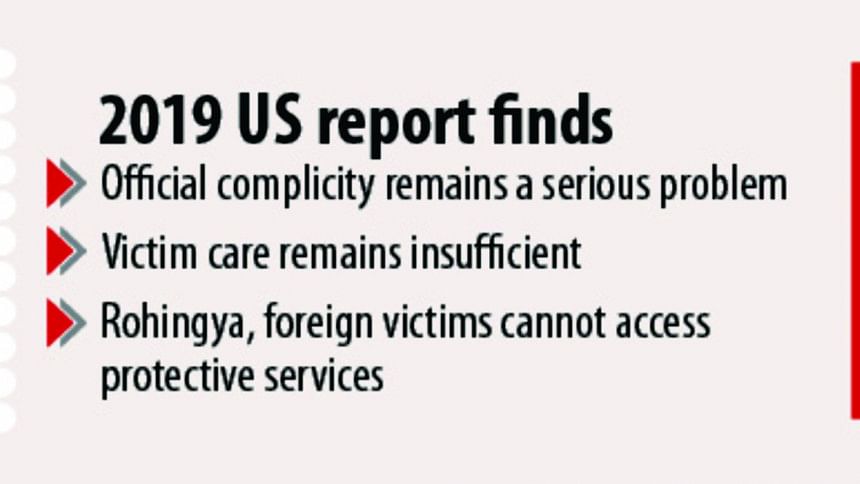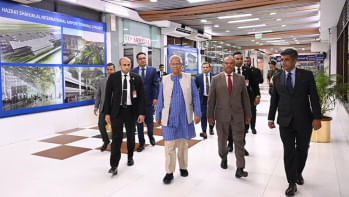Human trafficking: special tribunals to ensure speedy trials

The government is going to set up seven special tribunals for speedy trials in human trafficking cases as Bangladesh faces risks of US sanctions for not doing enough in combatting the heinous crime.
"Seven special tribunals will be established in divisional cities. They will start functioning from March this year," Law Minister Anisul Huq told The Daily Star on Wednesday.
The tribunals will surely help speed up the trial process of the human trafficking cases, he said.
Over 4,700 human trafficking cases are now pending, Anisul Huq said, expecting that the tribunals, once set up, will try the human traffickers to check such incidents.
The development comes after Bangladesh was ranked in Tier 2 Watch List for the last three consecutive years in the US Trafficking in Persons (TIP) Report.
As per the US law, Bangladesh is not eligible to remain in Tier 2 Watch List this year, said the US Embassy in Dhaka in an email response to The Daily Star on January 20.
"Either Bangladesh must show significant and increased efforts to meet the minimum standards to eliminate trafficking in persons and achieve a Tier 2 ranking or risk an automatic downgrade to Tier 3," it mentioned.
Any country ranked in Tier 3 is subject to severe restrictions and even full curtailment of non-humanitarian, non-trade-related assistance as set forth in Section 110(d)(1) of the US Trafficking Victims Protection Act (TVPA), it said.
Additionally, the US president may also withhold funding for Bangladesh government officials or employees for participation in educational and cultural exchanges.
The president can also instruct the US executive director of each multilateral development bank and the International Monetary Fund to vote against, and use his or her best efforts to deny, any loans or other uses of the institutions' funds to Bangladesh. Only the president himself can waive these restrictions.
However, US foreign assistance to support the people of Bangladesh through NGOs and other civil society organisations is not restricted under the TVPA, the embassy noted.
WHAT'S TIP?
US law defines TIP as recruiting, harbouring, transporting, providing or obtaining a person for labour or services, through the use of force, fraud, or coercion for the purpose of subjection to involuntary servitude, peonage, debt bondage or slavery.
It also includes a situation where a commercial sex act is induced by force, fraud, or coercion, or in which the person induced to perform such an act has not attained 18 years of age.
"A victim need not be physically transported from one location to another for the crime to fall within this definition," according to the US State Department annual TIP report, published in June 2019.
It ranks countries in four categories. Tier 1 rank means the countries fully compliant with the minimum standards in protecting trafficking victims; Tier 2 means the countries not fully compliant but making significant efforts.
Tier 2 Watch List means the countries not fully complying with the minimum standards in protecting trafficking victims; the absolute number of victims of severe forms of trafficking is very significant and there is a failure to provide evidence of increasing efforts to combat severe forms of trafficking.
Tier 3 means the countries not making significant efforts to combat trafficking.
POSITION OF BANGLADESH
Bangladesh has been ranked in Tier 2 Watch List for the last three years, with the TIP report of 2019 saying the country does not fully meet the minimum standards for the elimination of trafficking.
However, it says the country is making significant efforts to do so. The efforts included adopting a national action plan to combat trafficking, convicting traffickers, initiating an investigation into a police officer accused of child sex trafficking, and continuing to investigate some potential trafficking crimes against the Rohingya refugees.
However, it said, the government did not demonstrate overall increasing efforts compared to the previous reporting period. The government identified significantly fewer trafficking victims and did not consistently refer victims to care, and reports of it doing so were far fewer than the number of victims identified.
It also says victim care remained insufficient; Rohingya and foreign trafficking victims could not access protective services, and the government did not have shelter for adult male victims.
According to the TIP report, official complicity in trafficking crimes remained a serious problem, and the government did not report taking any action against some high-profile allegations.
Also, it says, the government continued to allow employers to charge high recruitment fees to migrant workers and did not consistently address illegally operating recruitment sub-agents, which left workers vulnerable to trafficking.
Quoting observers, the report said some police took bribes and sexual favours to ignore potential trafficking crimes at brothels, and some labour attaches, local politicians, judges, and police requested bribes from victims and their families to pursue cases.
Some officials from district employment and manpower offices allegedly facilitated human trafficking, and some traffickers in rural areas had political connections that enabled them to operate with impunity, it said.
Campaigners say though the government enacted the Prevention and Suppression of Human Trafficking Act in 2012, it has not yet established the special tribunals as suggested by the act.
As per the law, the investigation of alleged traffickers will complete in 90 days and the trial in 180 days, but that is hardly complied, they say.
According to an analysis by Brac Migration Programme, 4,529 cases were filed under the law between 2012 and February 2019, but only 103 were settled -- demonstrating the extremely low rate of conviction.
Human rights lawyer Salma Ali said it is good news that the government is going to establish special tribunals. "However, so far, the main problem that we have observed is the poor investigation," she said.
"The masterminds of the trafficking gangs remain untouched. Basically, some aides of the trafficking gangs came under investigation."
Law Minister Anisul Huq said, "We hope we can come out of the situation as we are setting up special tribunals for this."
The US Embassy in Dhaka said Bangladesh has to significantly increase prosecutions and convictions for trafficking offences, particularly of labour traffickers and complicit government officials, while strictly respecting due process if it wants to improve its ranking.
Bangladesh also has to take steps to eliminate recruitment fees charged to workers by licensed labour recruiters and ensure recruitment fees are paid by employers and improve identification of trafficking victims -- male and female within Bangladesh or repatriated from abroad -- and referral to care, it said.

 For all latest news, follow The Daily Star's Google News channel.
For all latest news, follow The Daily Star's Google News channel. 



Comments